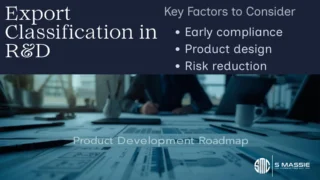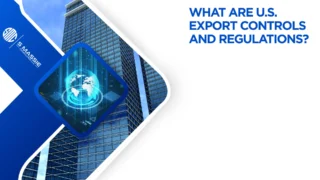The two main sets of regulations that govern the export of goods and technologies are the International Traffic in Arms Regulations (ITAR) and the Export Administration Regulations (EAR). Understanding the distinctions between these regulations is crucial for exporters to ensure compliance and successful international trade.
Let’s highlight some key differences between ITAR and EAR that exporters need to know:
Scope and Jurisdiction
- ITAR: Primarily regulates the export, temporary import, and transfer of defense articles, services, and related technical data listed on the United States Munitions List (USML). The U.S. Department of State’s Directorate of Defense Trade Controls (DDTC) oversees ITAR compliance.
- EAR: Covers the export, re-export, and transfer of dual-use items, software, and technologies that have both civilian and military applications. The Commerce Control List (CCL) categorizes these items, and the Bureau of Industry and Security (BIS) under the U.S. Department of Commerce administers EAR compliance.
Controlled Items
- ITAR: Strictly governs the export of defense articles and services, including firearms, ammunition, military vehicles, and certain technical data or software related to defense applications. Think of this as all the things that go boom or bang or have impressive technology to keep our soldiers safe on the battlefield.
- EAR: Covers a broader spectrum, including items with potential commercial or military applications, such as computers, navigation systems, telecommunications equipment, semiconductors, and more.
Registration Requirements
- ITAR: Any U.S. person or entity engaged in the manufacture, export, or brokering of defense articles or services identified on the USML must register with the DDTC and comply with stringent licensing requirements.
- EAR: While registration is not mandatory under EAR, exporters dealing with items listed on the CCL may need to apply for export licenses depending on the item’s destination, end-user, and intended use.
Licensing Procedures
- ITAR: Obtaining an ITAR license involves a more rigorous and time-consuming process due to the sensitivity of defense-related items. Each export transaction requires some form of government approval, whether it is a license, an agreement, or the use of a specified exemption.
- EAR: About 95 percent of all items exported from the United States don’t require an export license. When they do, the EAR generally offers more streamlined licensing procedures, especially for items falling under less stringent controls. Certain transactions may also qualify for license exceptions, simplifying the export process for eligible items even further.
- Both: Have the potential to require a license for the transfer of controlled technology to a foreign person within the United States. This is referred to as a “Deemed Export.”
Penalties for Non-Compliance
- ITAR: Non-compliance with ITAR regulations can result in severe penalties, including substantial fines, loss of export privileges, and even criminal charges or imprisonment.
- EAR: Violations of EAR may lead to civil penalties, fines, and restrictions on future exports, and even criminal charges or imprisonment, depending on the severity of the breach and intention or gross negligence.
International Reach
- ITAR: Applies extraterritorially, meaning it encompasses activities conducted outside the United States involving defense articles and services.
- EAR: While primarily focused on items of U.S. origin, EAR also governs the re-export and transfer of certain foreign-made items containing controlled U.S. components or technology.
Comprehending the differences between ITAR and EAR is paramount for exporters dealing with regulated goods and technologies. Failure to comply with these regulations can lead to significant legal repercussions, impacting business operations and reputation.
Exporters must assess their products’ classification, destination, end-users, and intended uses to determine the applicable regulatory framework and ensure compliance throughout the export process.
Seeking guidance from consultants or legal experts specializing in export control regulations can further aid in navigating the complexities of ITAR and EAR, safeguarding your business from potential compliance pitfalls while facilitating international trade within legal boundaries.
Contact us to schedule a consultation or compliance review.






